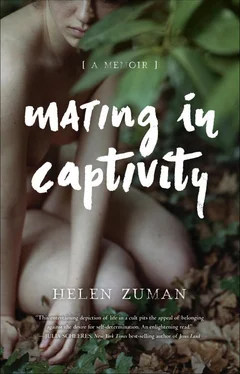I knew Arol and Swan would hate how little we’d made. But, I thought, the drubbing I was in for wouldn’t crush me—all seven of us would share the blame.
The next morning, gathered at the dining hall table with every adult Zendik except Arol and Prophet, I learned I’d misled myself: I alone was going to pay.
The table, built to seat all forty of us, with room to spare, was a heavy wooden parenthesis with a cat-pupil slit down the middle. I called it the Eye of Sauron table because this slit mimicked the void, irised by fire, through which Tolkien’s formless villain keeps watch over his kingdom and those who wear his rings.
Swan, at the table’s head, stretched forward and pressed fingers crowned with polished nails into its glossy finish. Jaw clenched, she addressed us.
“This meeting is about Helen and the utter bullshit she pulled in Charlotte. We lost thousands of dollars because of what she did, trying to take Rayel down. Why no one had the balls to call home and turn her in—or boot her off the trip—I don’t know. But the bottom line is, we can’t have people betraying us from the inside.”
The collective gaze swept to me. My eyes popped wide open, as if someone had duct-taped my lids to my cheeks and brows. I will take this , I thought. I will look straight at what I did. I will not look away.
Seconds later, Arol appeared at the top of the stairs to the kitchen, Prophet at her shoulder. Every head swiveled toward her. “It’s her relationship with Kro. They’re smug and superior. You all leave them alone ’cause you see them talking to me. That’s not enough. They have to open their affair to the group. They can’t keep running their own show.”
With that, Arol let go. Of me, of my union with Kro.
Years earlier I’d written of Zendik, “There is no illusion here of unconditional love. No bond not dissoluble, in a culture based on survival.”
Survival of what? Of all life, I would have said. Of our outlaw tribe. But really it was Arol’s rule that fed on dissolution. For it to last, each of us had to love her best and stay possessed by how to please her. Stretches in her shitter upped our desire to suffer for her favor.
I may have hastened my fall by assailing Rayel and hitting on Prophet. I could not have stopped it.
I could have tried to flee with Kro.
I could have crept up to his space, late one night, roused him with a touch, crouched by his pillow to whisper, “Kro, I want to be with you. That can’t happen here. Let’s leave. Now. Let’s just go.”
I could have left alone, hoping he would follow.
I could have formed a scheme to lure him out.
But I wouldn’t buck Arol for Kro. Or babies. Two months after the Weenie Roast, we broke for good.
Arol hadn’t taken a hammer to our relationship. She’d just dropped it—not looking down—from a cliff littered at the base with shattered remains.
By December 2003, I was mourning my story of love enduring with Arol’s support. If I couldn’t swing this with Kro, I thought, I couldn’t swing it at all.
What was left? Service to Zendik. From then on, I vowed, I’d surrender any love I found the moment a clash rose between union and group.
The day after my break with Kro, Arol approached me in the dining hall and addressed me kindly for the first time since the morning before the Weenie Roast. “You look so much better,” she said. “So much more relaxed. I think you made the right choice.”
I nodded, grateful for her imprimatur. Maybe, soon, I’d write something she’d want for the magazine. Maybe I’d do better on the street. Surely the circle-Z around my neck was the only ring I’d ever need.
“Thank you, Arol,” I said.
ZAR’S PICKUP TORE DOWN Regan Jackson, bed crammed with fifteen Zendiks. I stood behind the cab, clutching the front crossbar of the truck’s rack, hair rough with dust. The morning sun warming my skin warned of a sweaty day to come.
As Zar hung a right onto Deep Gap, I craned my neck for a longer look at a green velvet dell enveloping a stone-rimmed pond that belonged in a fairy tale. Past the pond lay a meadow edged by a stream—and pimpled with a grid of range poles. Wildcat Spur had been sold, and the new owners meant to stud the ridge with houses and reduce the meadow to a hole on a golf course. Every day, flatbed semis packed with tree trunks thundered down the mountain.
The seller, George Levin—described to me when I’d arrived in 1999 as “some rich jerk from Florida”—had realized a hefty profit, thanks to soaring demand for housing in and around Asheville. His greed, Arol said, was bleeding our ecosphere. She’d decided to move the entire Farm, animals and all, to West Virginia. Having fled first San Diego’s and then Austin’s boomtown sprawl, only to face the metastasis of Asheville, she sought respite in a backward state with a shrinking population. Plus, West Virginia was hours closer than North Carolina to markets like Boston, New York, and Washington, with their perpetual flows of fresh prospects.
Within West Virginia, Arol chose Pocahontas County, which had drawn waves of back-to-the-landers decades earlier. More than half the county’s acreage was preserved in the public trust, and its air, water, and soil were some of the state’s purest. By late July 2004, she’d purchased a 183-acre ranch backed up against the Monongahela National Forest. It came with barns, a mansion, a stone-rimmed pond—and an $850,000 price tag. Later that summer, the North Carolina Farm, split into fourteen lots and auctioned off, would net Arol roughly $700,000, more than doubling what she’d paid in 1999. She, too, would gain from Asheville’s boom.
The suggestion of West Virginia had come from Levin’s caretaker, David Gillespie, who was also thinking of relocating. It was Gillespie who’d traded Arol occasional use of his excavator for thousands of hours of Zendik sweat: Zar dug a swimming hole and septic trench with Gillespie’s giant iron claw; crews of six, twelve, twenty Zendiks built him an extensive cattle fence. Despite Gillespie’s link to the enemy, Arol billed him as a friend.
Passing the last of the range poles, Zar swerved into an oval driveway and stopped short before a hunting lodge cum palace. I jumped down from the truck bed, brushed the dust from my hair, and stared. The house seemed large for a bachelor caretaker. Our mission, as I understood it, was to help Gillespie pack for his move off the mountain.
Zar reversed and roared off, yelling he’d return for us at lunchtime. I followed the others through a side entrance policed by a pinched man with pale, indoor skin. “Watch the carpet!” he barked. “Wipe your feet!”
He said his name was Andy, then skipped to giving orders without asking our names. “I want the men to wrap the heavy stuff.” He pointed to a room full of desks, tables, and dressers. “And I want you girls on chairs and mirrors.” He led us into a high-ceilinged parlor holding multiple sets of matching chairs and a dozen gilt-edged mirrors.
I kept my gaze blank till Andy pranced out. Then, turning to a mirror propped against the back wall, I let a sneer curl my nose and lips. “I want you girls on chairs and mirrors,” I muttered, pitching my voice higher and harsher than his. Who is this guy? Where does he get off bossing us? And what’s up with giving the girls the light stuff? What are we, a bunch of fucking debutantes?
I might have spoken up—but Arol had sent us.
I attacked the packing job. Ripped wrap off the roll in rough swaths. Crushed corners. Slapped tape on botched seams.
What if a chair leg should—oops!—strike a mirror? I fantasized smiling at the fine mesh of cracks crazing its face.
Читать дальше











